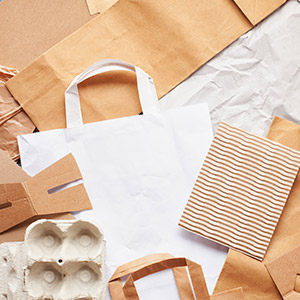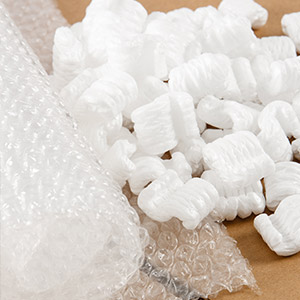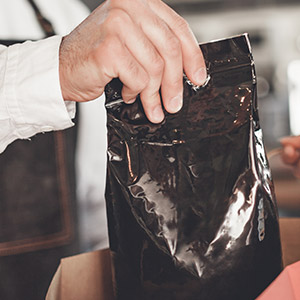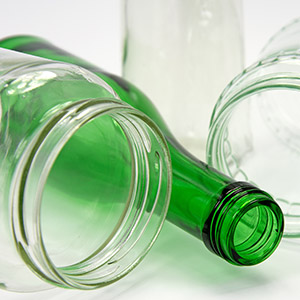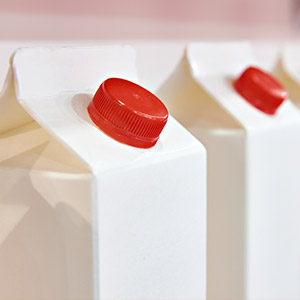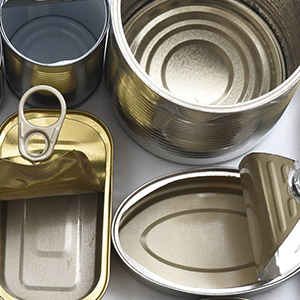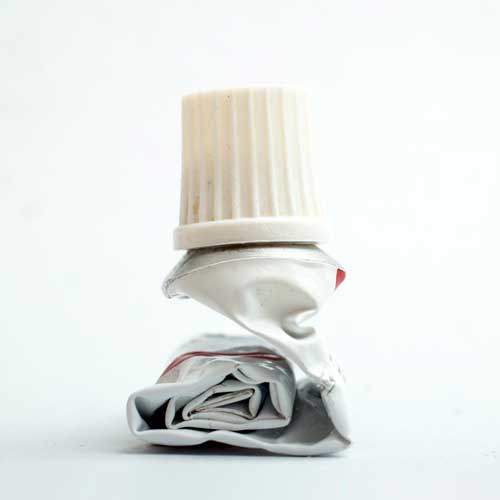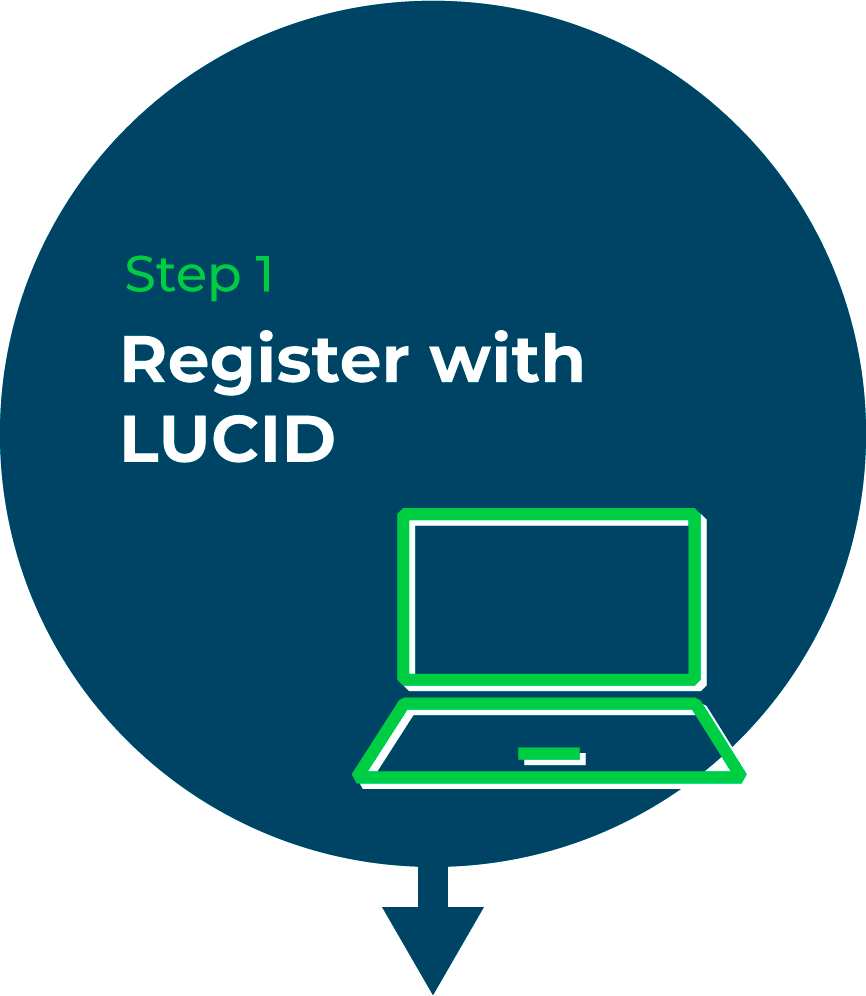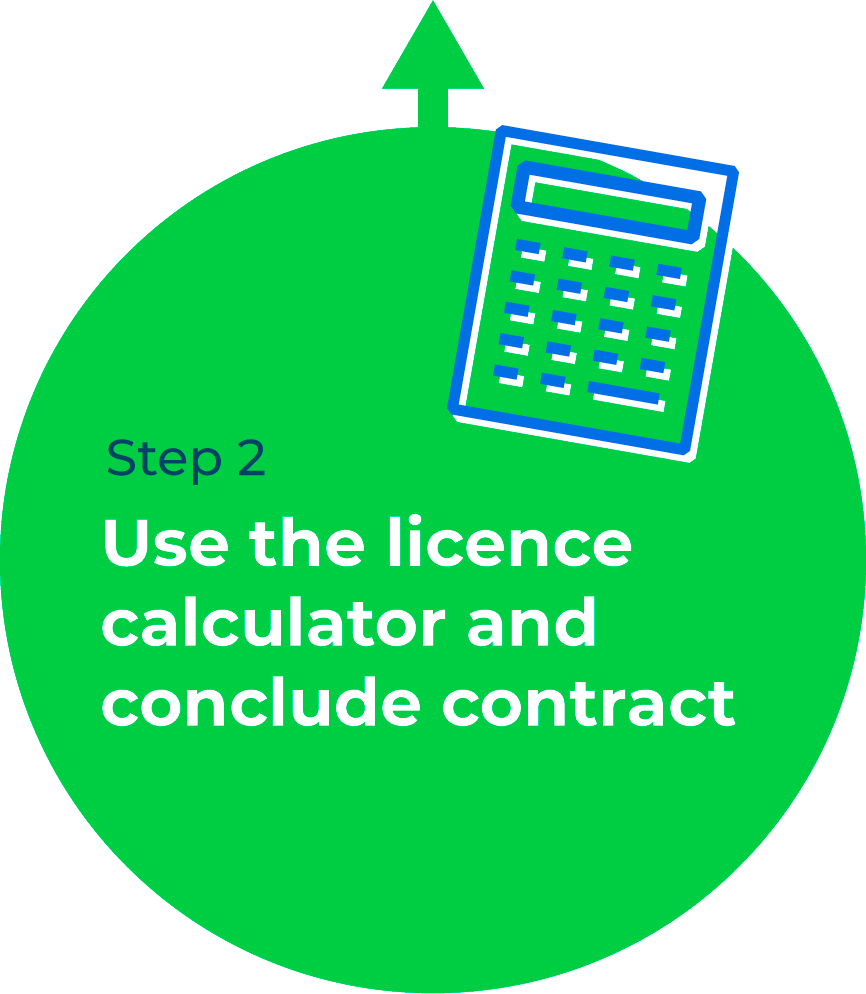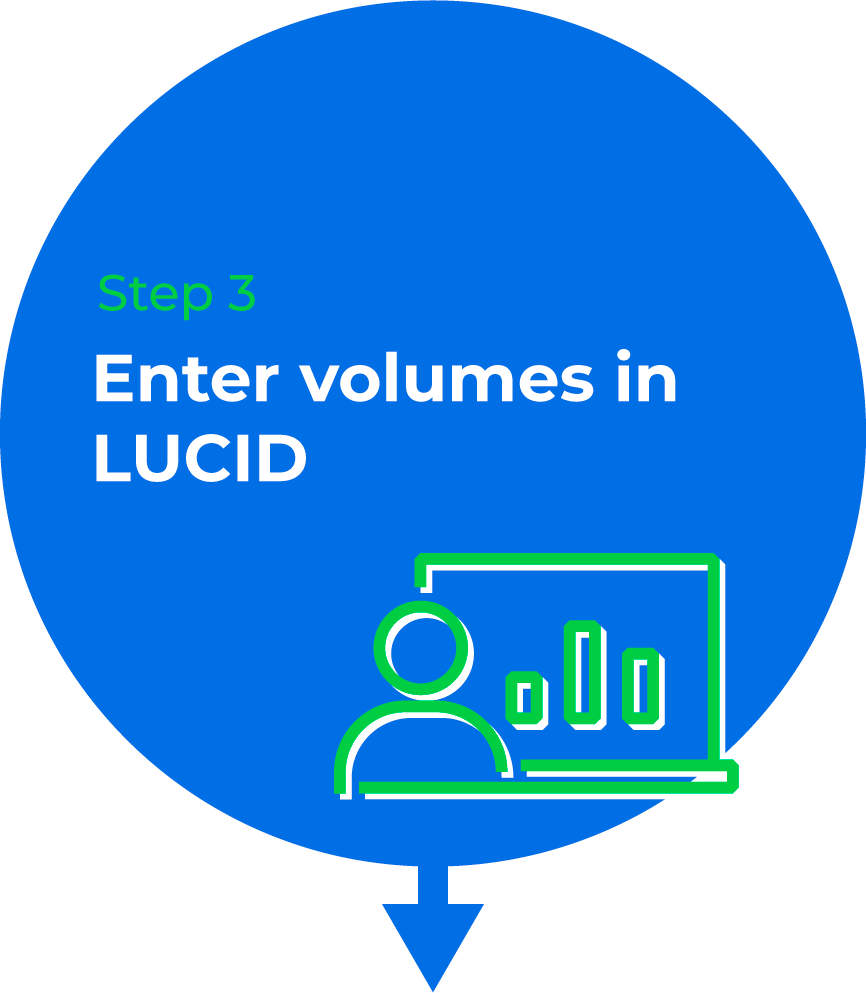Packaging licensing – what’s it all about?
Under the German Packaging Act, packaging licensing, or participating in a dual system, is obligatory for both manufacturers and retailers who place sales or grouped packaging – referred to as initial distributors – on the market in Germany. This means that anyone who fills packaging that is subject to mandatory participation with goods for the first time must obtain a licence for it. In other words, they must participate in the dual system. This applies regardless of whether placing the packaging on the market is subject to a fee or not.
With our licence calculator, you can work out the licence fee for your packaging volume in just a few clicks and sign a licence agreement online. Please note: Failure to meet your legal obligation to participate in a scheme can result in severe penalties, or even a distribution ban. To avoid this, register for your licence here.

Your obligations under the German Packaging Act
Anyone who places packaged goods on the consumer market for the first time must participate in a dual system with their packaging. In this way, the German Packaging Act ensures that manufacturers and retailers take responsibility for taking back their packaging. Here’s everything you need to know about your obligations.
What types of packaging need to be licensed?
In general, all sales, transport, service and grouped packaging containing goods, and which typically becomes waste after removal by a private consumer, is subject to mandatory participation. Only transport packaging that remains with commercial retailers is exempted from participating in the dual system.
Packaging licensing in three simple steps
Let us guide you through the process of obtaining a packaging licence with Noventiz Dual
Register with the database LUCID, the Central Agency Packaging Register.

Year-end data report:
At the beginning of each year, you report the actual amount of packaging from the previous year to us and to the central register. Here, you report the amount of packaging subject to mandatory participation that was actually put into circulation.
How much does the packaging licence cost?
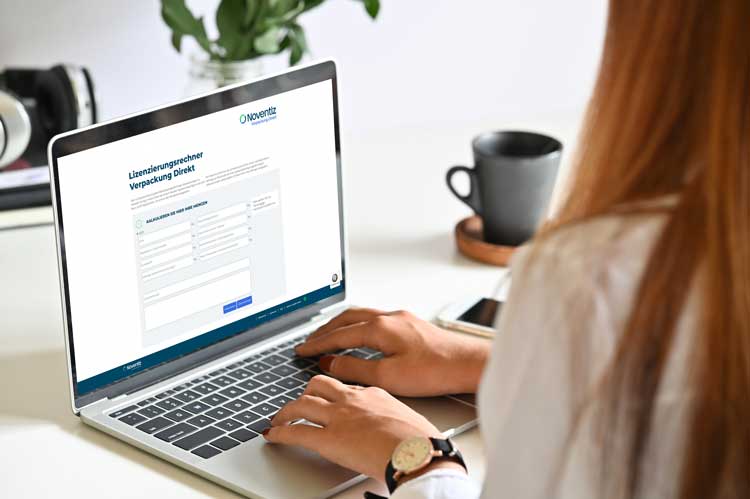
Use our online licence calculator to find out how much it will cost to participate with your packaging volume. If you wish, you can sign a packaging licensing agreement immediately.
Good to know
When you first sign up, you will be asked to indicate the planned amount of sales packaging for the respective calendar year in kilogrammes.
You don’t know what the weight of your packaging is?
Simply weigh one of your packaging units which is subject to mandatory participation and multiply the result by the number of packaging units you intend to put into circulation to work out the total weight of packaging.
Your benefits with Noventiz

- Easy-to-use online licence calculator
- Online portal for reporting packaging volume
- Tailored advice
- Customer-friendly cancellation terms
- Minimum contract period: 1 year
- Price guarantee for volumes reported at the end of the year (for Packaging Direct customers)
- No system costs for volume changes
- CO2 certificate
- Information service on reporting deadlines
- Discounts for EU food service packaging
- One-stop-shop for WEEE and batteries, even small volumes
Testimonials
Anja Tauwel,
Tineco
We are an online retailer, so packaging licensing is quite an abstract topic for us. Noventiz was great at helping us meet our obligations under Extended Producer Responsibility. I particularly liked the online calculator, which is super easy to use. Thoroughly recommended!
Andreas Burkhardt,
Burkardt Feinkostwerke
Noventiz delivers great value for money and is responsive to our needs. We appreciate the long-standing partnership.
Annika Bittner,
Enders Colsman AG
I always have a personal point of contact who responds quickly and takes care of my problems. I am very happy with the way we work together.
Who needs a packaging licence?
Whether or not a manufacturer or retailer is obliged to license its sales packaging depends on whether any packaging subject to mandatory participation is put into circulation in Germany. Accordingly, companies that only produce the packaging material itself are not considered to be manufacturers within the meaning of the German Packaging Act.

Small businesses
The German Packaging Act applies to all businesses – regardless of their size. This means that there is no de minimis limit. Participation is mandatory, even for just one packaging unit filled with goods and brought into circulation.
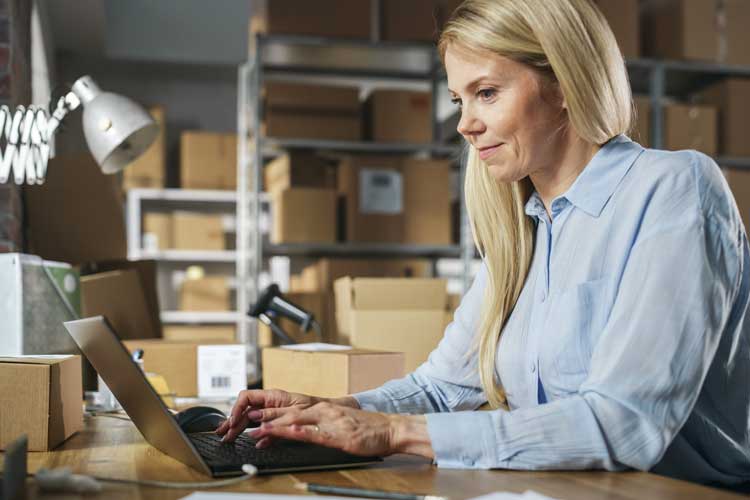
Online retailers
All commercial online retailers are obliged to license their transport packaging, starting with just one box filled with goods. If a retailer is also a manufacturer or importer of goods, they must also participate in the scheme and register the volume of product packaging placed on the market.

B2B
According to the German Packaging Act, business-to-business (B2B) trade is also subject to mandatory participation if it is a comparable source of waste. This includes, among others, administrative bodies, catering and agricultural businesses. Packaging produced in these areas must be licensed.
Help us to protect the environment
Together for more sustainability
The aim of the German Packaging Act is to minimise the environmental impact of packaging. To this end, the law defines who is responsible for the packaging: the party that first places the packaged goods on the market. This is the party that pays a fee to the dual systems. The income from these fees is used to pay for us to dispose of and recycle the packaging. Ultimately, this helps us all to save important resources and protect our environment.
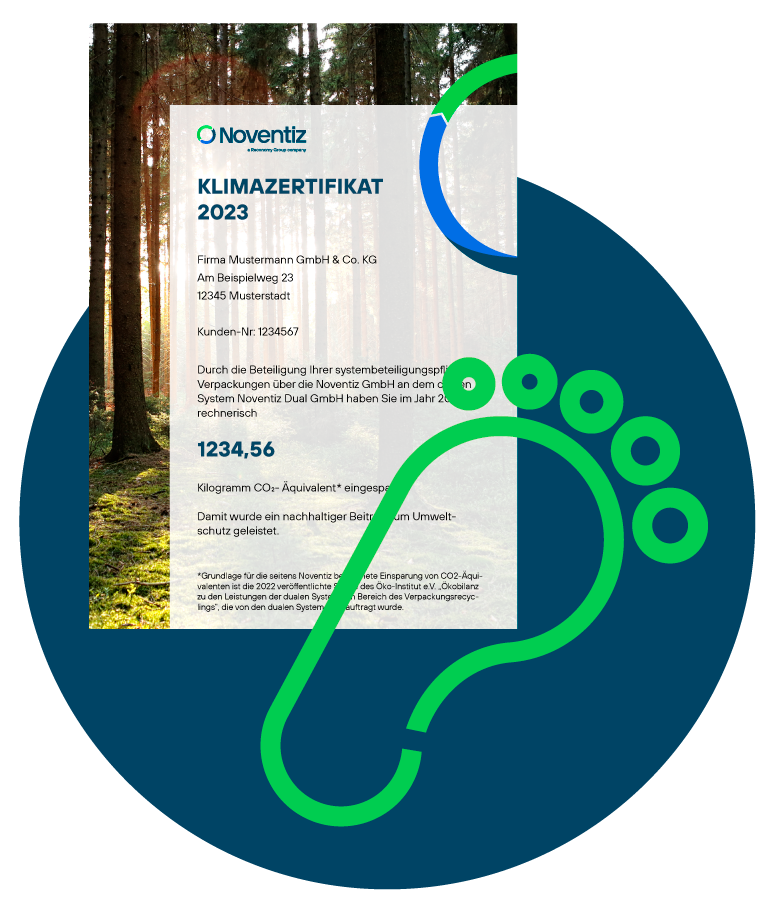
When you sign a licence agreement, you will receive a free climate certificate to show your customers how much CO2 you are saving by licensing your packaging.
Quick info: The German Packaging Act
What does the German Packaging Act say?
The German Packaging Act (VerpackG) came into force on 1 January 2019 with the aim of obliging those who place packaging on the market to take responsibility for their products. It ensures that manufacturers and retailers meet their obligations to take back and recycle their packaging.
Anyone who places packaged goods on the consumer market for the first time must participate in a dual system with their packaging, in other words, participate in one of the dual systems.
How the dual systems work
Manufacturers, distributors and online retailers must license their packaging that is subject to mandatory participation. Managing this complex process is extremely cumbersome. This is where dual systems such as Noventiz Dual come in. Dual systems ensure that as much of the packaging subject to mandatory participation as possible is properly collected from consumers, sorted and recycled. Companies pay a fee to the system in which they participate, the amount of which depends on the weight (mass) and material type of the sales packaging.

Controlling authority Central Agency Packaging Register
All dual systems and all manufacturers (initial distributors, online retailers, importers, etc.) are continuously monitored and controlled by the Central Agency Packaging Register (ZSVR). The public LUCID Packaging Register is accessible to everyone free of charge and shows whether a company is properly fulfilling its legal obligations. Companies that do not comply with their legal obligations can be fined up to 200,000 euros.
Frequently asked questions on packaging licensing
If you place packaging on the market for the first time that ends up as waste with private final consumers (e.g., yellow bag/yellow bin), you are obliged to register with the Central Agency Packaging Register and to report the packaging volume to the dual system.
The volume of packaging subject to mandatory participation is irrelevant – there is no de minimis limit. You are obliged to participate in a dual system – such as NOVENTIZ – starting from the first packaging you fill and/or ship. There are very few exceptions to this rule. Distributors, manufacturers, online retailers and small businesses selling through platforms such as eBay or Amazon must participate in the scheme with their sales packaging.
Under the German Packaging Act, you must participate in the scheme with all packaging prior to placing it on the market, which is why it is recommended to license your packaging that is subject to mandatory participation at the beginning of the calendar year. You simply provide an estimate of the packaging volume you intend to place on the market. The final licence fee is calculated based on the type and weight (mass) of the packaging actually distributed.
Please note: You should register and participate in the scheme before offering or producing any goods, and certainly before placing them on the market!
The licence is generally valid for a full calendar year, this means even if you wish to obtain a licence from mid-year, you must register for the entire calendar year. Most dual systems offer licence contracts running from 1 January to 31 December.
If you have failed to obtain a licence for your packaging that is subject to mandatory participation, you should do so as soon as possible to avoid fines or a distribution ban. To obtain a retrospective licence, simply declare the actual quantity of packaging placed on the market during the year in question. The year-end data report must be submitted to the dual system – in this case, to us – and to the Central Agency Packaging Register.
Companies are responsible for participating in a dual system and for registering with the LUCID Packaging Register. Failing to report packaging that is subject to mandatory participation or reporting incorrect volumes is a breach of the German Packaging Act, which is punishable with a fine of up to 200,000 euros and a distribution ban. Furthermore, companies in breach of the Packaging Act open themselves up to cease and desist letters from competitors. Market participants can easily monitor each other’s compliance through the central register, which is openly accessible, creating mutually fair conditions.
There is no de minimis limit for the obligation to license packaging. Manufacturers and retailers must participate in the scheme for each gram of sales packaging.
At the other end of the scale, above a specified volume of packaging placed on the market, the Packaging Act provides for obligations beyond registration and licensing:
Distributors are obliged to submit a declaration of completeness, which must be confirmed by a registered expert, auditor, tax consultant or registered accountant and submitted to the central register.
A declaration of completeness becomes necessary from the following volume per year:
- glass: 80,000 kilogrammes
- paper, paperboard, cardboard: 50,000 kilogrammes
- plastics, metal, composite materials (in sum): 30,000 kilogrammes
Yes, there are. Food service packaging is filled at the point of sale, for instance a sandwich is wrapped into a paper bag. If the most recent distributor – in this case the bakery – is the first to fill the food service packaging and place it on the market, it does not necessarily have to have its own registration number with a dual system. In this case, the bakery can use pre-licensed packaging or require the previous distributor to participate in the scheme with its own registration number. However, the most recent distributor must still participate in the scheme via the LUCID Packaging Register, indicating that it is using pre-licensed packaging.
Please note that shipping packaging is subject to mandatory participation.
No, you don’t, because the German Packaging Act only applies to products that are placed on the German market. Products that are shipped/sold abroad are not subject to the German Packaging Act. The laws of the respective country apply. When the packaging is first placed on the market, the design or accompanying documentation must prove that the packaging will not be used in Germany but is intended for export. If the packaging ends up with a final consumer in Germany, you must participate in the scheme as soon as possible.
Please note that many importing countries have their own laws on the disposal and recovery of packaging and packaging materials. Please check the relevant national regulations.
Yes, they do. Any packaging imported into Germany must participate in the scheme under the German Packaging Act because it ends up as waste in private consumer households within the scope of the German Packaging Act (Germany). The company importing such packaging into Germany is responsible for obtaining a licence. This is usually the importer that brings or arranges the import of the goods into Germany.
Foreign sellers or retailers that sell directly to customers in Germany are obliged to participate in the scheme with their packaging. This applies equally to importers from inside and outside the EU.
Licensing packaging from China
We also offer packaging licensing for exporters of goods – and therefore packaging – from China to Germany.
